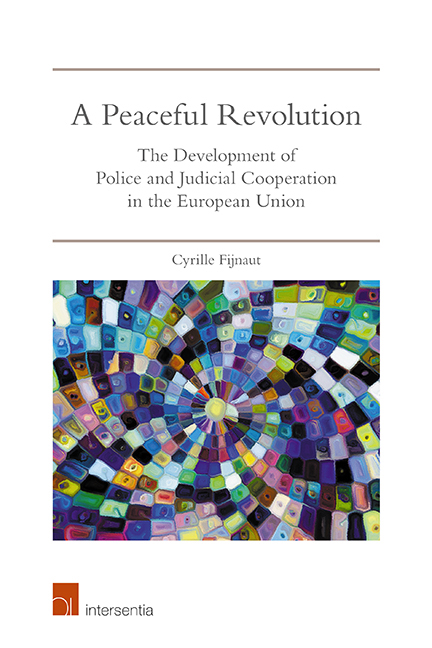Book contents
- Frontmatter
- Preface
- Contents
- List of Acronyms and Abbreviations
- Chapter 1 General Introduction
- PART I THE HISTORICAL BACKGROUND TO POLICE AND JUDICIAL COOPERATION IN THE EUROPEAN UNION
- PART II THE FOUNDATION OF POLICE AND JUDICIAL COOPERATION IN THE EUROPEAN UNION
- Chapter 4 The Treaty of Maastricht and the Brussels Programme
- Chapter 5 The Treaty of Amsterdam and the Tampere Programme
- Chapter 6 The Treaty of Rome and the Hague Programme
- PART III THE CURRENT STATE OF POLICE AND JUDICIAL COOPERATION IN THE EUROPEAN UNION
- Bibliography
- About the Author
Chapter 6 - The Treaty of Rome and the Hague Programme
from PART II - THE FOUNDATION OF POLICE AND JUDICIAL COOPERATION IN THE EUROPEAN UNION
Published online by Cambridge University Press: 09 November 2019
- Frontmatter
- Preface
- Contents
- List of Acronyms and Abbreviations
- Chapter 1 General Introduction
- PART I THE HISTORICAL BACKGROUND TO POLICE AND JUDICIAL COOPERATION IN THE EUROPEAN UNION
- PART II THE FOUNDATION OF POLICE AND JUDICIAL COOPERATION IN THE EUROPEAN UNION
- Chapter 4 The Treaty of Maastricht and the Brussels Programme
- Chapter 5 The Treaty of Amsterdam and the Tampere Programme
- Chapter 6 The Treaty of Rome and the Hague Programme
- PART III THE CURRENT STATE OF POLICE AND JUDICIAL COOPERATION IN THE EUROPEAN UNION
- Bibliography
- About the Author
Summary
INTRODUCTION
The Commission's comments on decision-making in the area of freedom, security and justice when evaluating what had been achieved under the banner of the Treaty of Amsterdam were not isolated comments. They expressed the position it had already taken in 2000 – 2001 in the run-up to the debate in the convention on the future of the European Union. According to the Commission, the treaties needed to be modernised and simplified in order to address more quickly and adequately the many social, economic and political challenges. This would enable the Union to better meet the expectations of its citizens for a decisive and effective solution to these problems. And what applied to the future Union as a whole should also apply to the area of freedom, security and justice. Here too, the decision-making process had to be adapted in this way.
In the Laeken Declaration of 14 – 15 December 2001, in which the European Council – following Declaration No. 23 on the future of the Union annexed to the Treaty of Nice – had called for a review of the existing treaties, it is noted in this respect that citizens have expressed their wish to see the Union play a greater role in matters of justice and security, combating cross-border crime, managing migration flows, and receiving asylum seekers and refugees from peripheral conflict zones. These citizens would call for a clear, transparent, effective, democratically managed Community approach to these problems. The conclusions of the Laeken Summit set out some of the implications of this. They stressed the need for better management of external border controls, which would help in the fight against terrorism, illegal immigration and people trafficking. With regard to police and judicial cooperation, on the one hand, the progress made in setting up Eurojust and strengthening Europol's powers was highlighted. On the other hand, there was a call to swiftly examine the possibilities of establishing a European Public Prosecutor's Office.
The Parliament was able to agree to these plans in advance. This is abundantly clear from the resolution it adopted for the Intergovernmental Conference on 13 April 2000.
- Type
- Chapter
- Information
- A Peaceful RevolutionThe Development of Police and Judicial Cooperation in the European Union, pp. 311 - 438Publisher: IntersentiaPrint publication year: 2019



